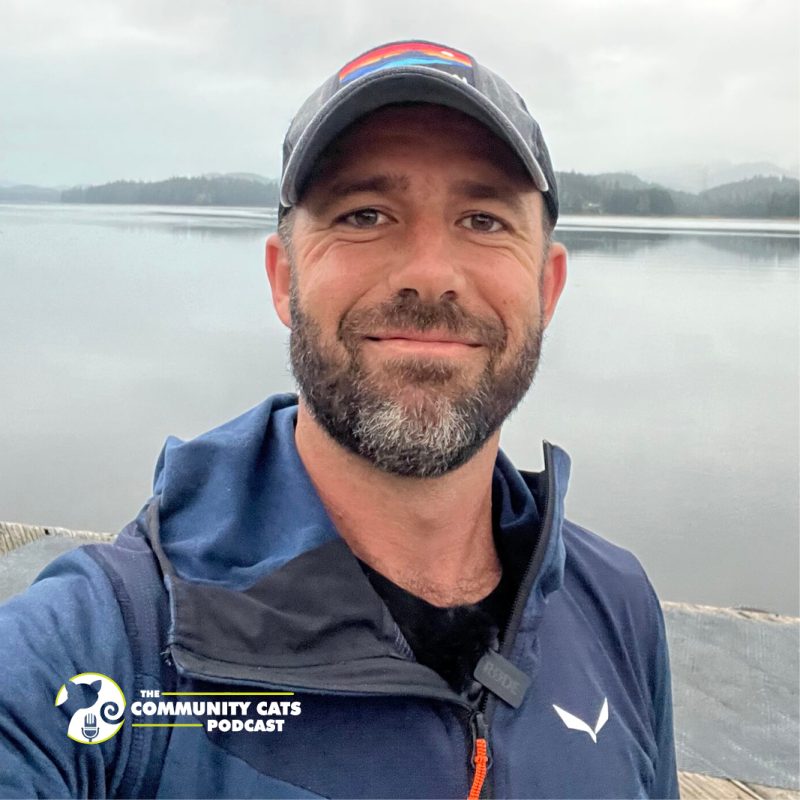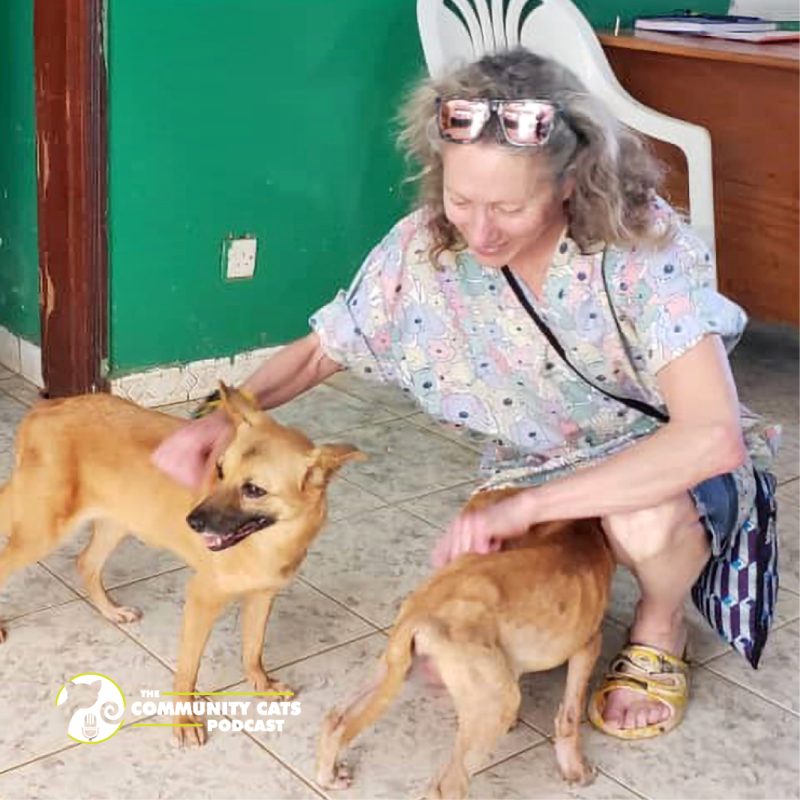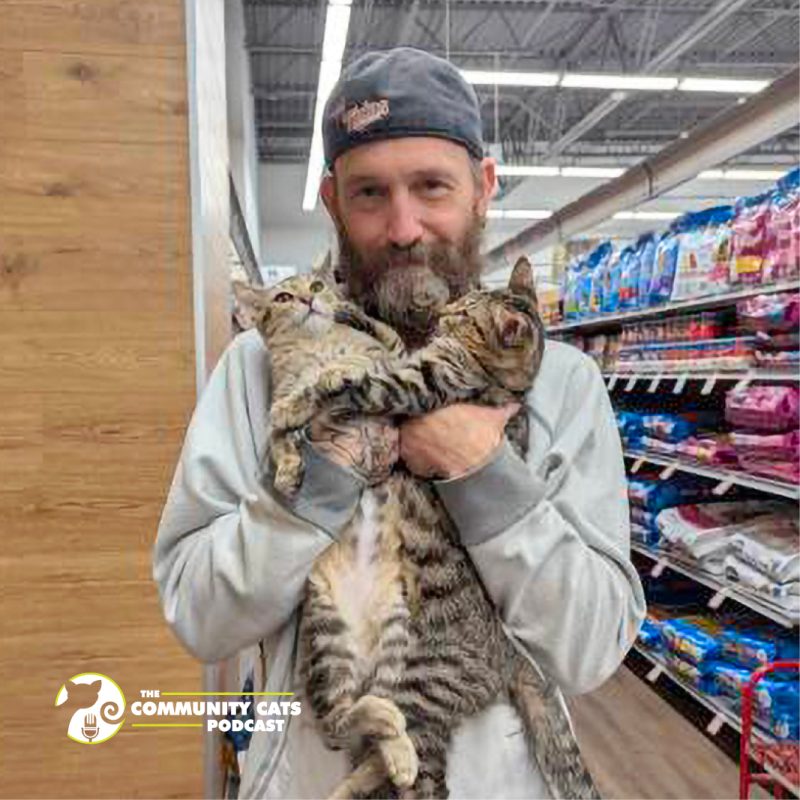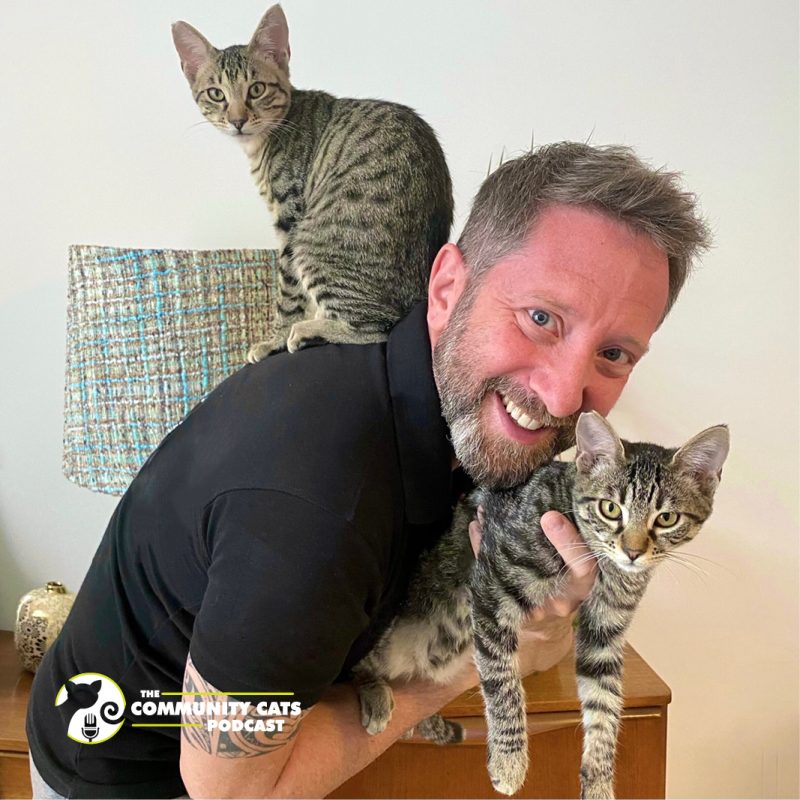
Crisis in Texas: American Pets Alive! Responds
March 12, 2021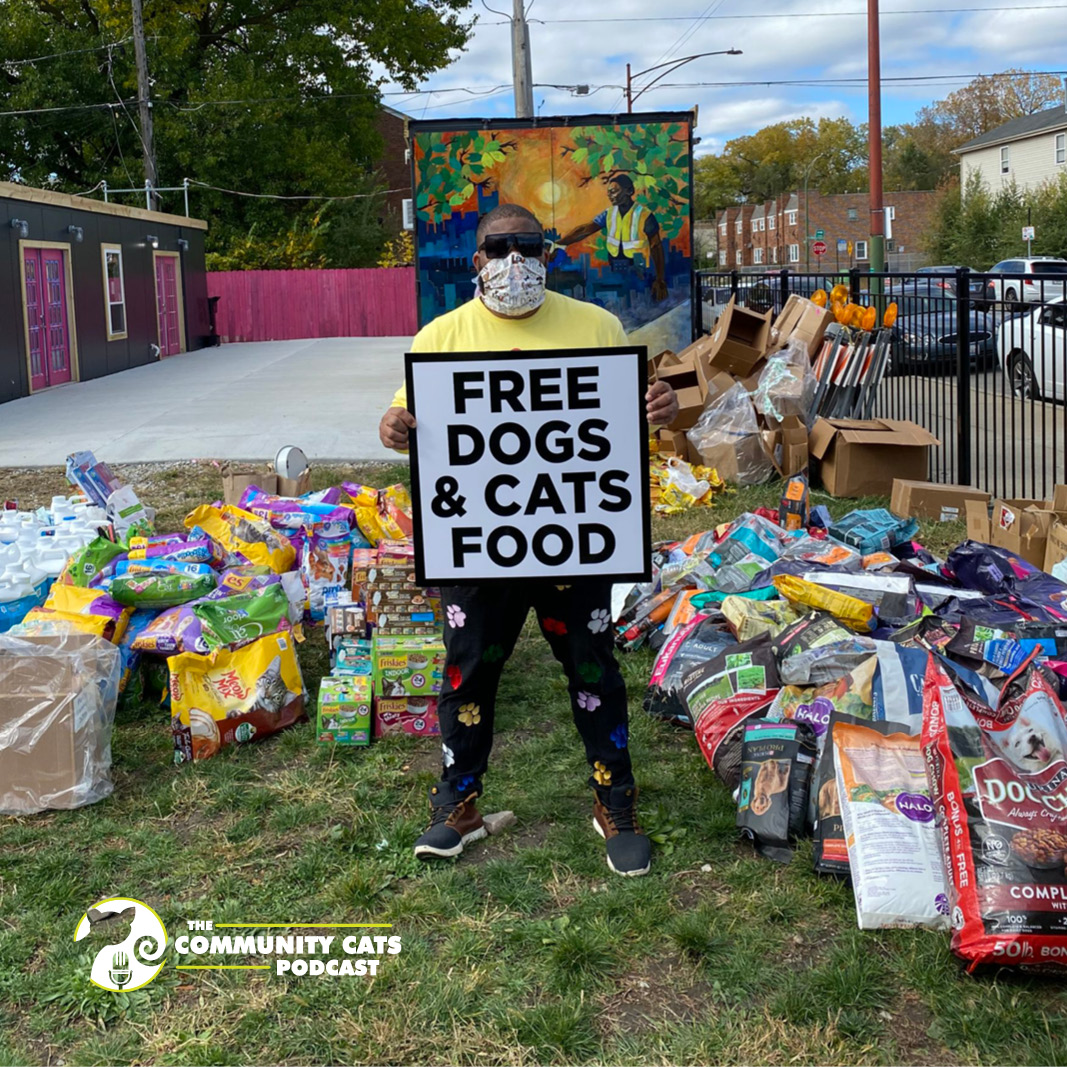
Peter Elueze, Founder of Paw Salvation
March 23, 2021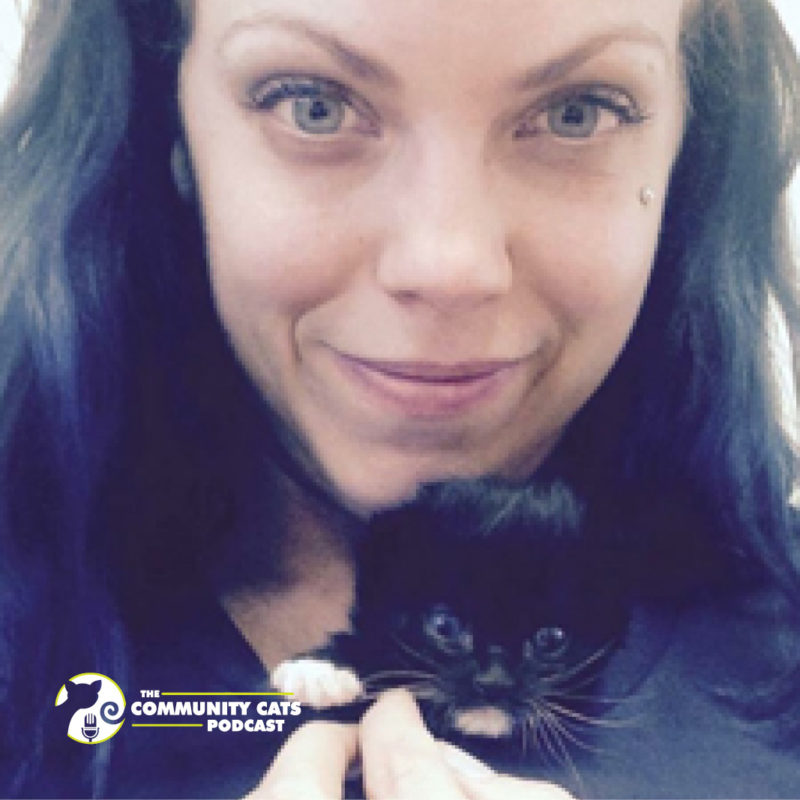
“After people try [fostering feral kittens] and they have that first successful adoption, or that first purr or that first play, they’re hooked.”
Listen to Episode #395 Now
This episode is sponsored in part by TICA and Doobert.com.
Stacy chats with Mariah McCulley, Director of Operations at Animal Friends Alliance, a limited admission, adoption guarantee shelter for cats and dogs in Fort Collins, CO. Mariah has experience with TNR, high volume spay and neuter clinics, adoption, and, her passion, fostering feral kittens.
Animal Friends Alliance has a strong focus on providing community resources to keep animals in their homes. They provide subsidized cost spay/neuter, a kibble supply program, and a community cat program. Their work with TNR has seen success in reducing the volume of cats in Fort Collins and has now expanded to cover a wider range around Northern Colorado and into Wyoming and Nebraska.
Mariah’s passion is fostering feral kittens and she shares with Stacy some tips for successful feral fostering and how organizations can support their fosters and adopters. Some of her tips include separating feral kittens from their littermates and using play as a tool for giving confidence to kittens. She also notes it’s important to prepare and support both fosters and adopters for potentially less socialized kittens, encouraging fosters to view the kittens through the lens of an adopter and making sure to be honest with adopters about what to expect.
If you have questions for Mariah, you can reach her at mariah.mcculley@savinganimalstoday.org. You can find out more about Animal Friends Alliance on their website.
Read Episode #395
Kristen Petrie [00:00:02]
You've tuned in to the Community Cats Podcast ready. Let's go.
Stacy LeBaron [00:00:13]
Welcome to the Community Cats Podcast. I am your host, Stacy LeBaron. I've been involved helping homeless cats for over twenty years with the Merrimack River Feline Rescue Society. The goal of this podcast is to expose you to amazing people who are improving the lives of cats. I hope these interviews will help you learn how you can turn your passion for cats into action. Today we're speaking with Mariah McCulley. Mariah has been employed by Animal Friends Alliance for over nine years. She graduated from Colorado State University in two thousand nine with a Bachelor of Science in Zoology and has always known she was supposed to work with animals. She has experience in high-volume spay neuter clinics, adoptions, customer service, TNR, and of course, fostering feral kittens. She realized early on that most feral kittens have the odds stacked against them and many never get a shot or a second chance. That just had to change. So, then her world began to revolve around fostering ferals herself and helping others to foster them, as well as giving them the tools and support that they need. Mariah, I'd like to welcome you to the show.
Mariah McCulley [00:01:19]
Stacey, thank you so much for the invitation and for having me on today. I'm so excited to talk about this subject in particular. And I really hope that at the end, all the listeners will have gained even a small tidbit of something they can take back to their community, to make a difference for feral kittens and community cats.
Stacy [00:01:37]
That’s great. Excellent. So of course, this is a question I start off with most every one of my guests. How did you become passionate about cats?
Mariah [00:01:45]
That is a great question and I think it's a very different answer for everybody. Interestingly enough for me, as a kid, you know, I was always out running around building forts, all that fun stuff, always outside. We were right before the internet generation and actually my mom was a cat breeder which is you know, a very interesting fact to think about now that I'm older and doing what I do, but I do have to admit, you know, growing up around kittens and stuff obviously made a huge impact for me as an adult and it obviously helped me learn so much about cats and you know, caring for animals in general. But I think, you know the downside of it was just being a kid, not knowing, you know, what breeding meant and overpopulation and just being really protected from all of that negative information that people seem to be a lot more privy to now. So I think the answer to that question is just growing up around animals, always being adventurous and I was just lucky. I was one of those people that just knew somehow in my life, you know, that I would have to work with animals and I just kind of settled on cats to begin with. Even though I have cats, I have dogs, I've had lizards, you know, the whole thing but I think cats are, compared to dogs, definitely under-supported in the United States for behavior, healthcare for animals, you name it. So I kind of just fell into that calling pretty, pretty early on.
Stacy [00:03:06]
So I want to ask you a little bit more specifically what you're talking about cats being under-supported. I mean, I've had certain stories or situations. I run into dumpsters full of feral kittens and, you know, trailer parks where there's a lot of cats. People own them but yet they also can't afford all the care for them. So, I've had these various stories. Have you had stories like that, to basically help educate you in understanding that really cats are underserved compared to maybe dogs and other animals, even rabbits? I've heard people say that rabbits sometimes get better care than cats.
Mariah [00:03:43]
Absolutely, like a hundred and ten percent. You know, I mean, I'm out here in Colorado, in Fort Collins, Colorado. Colorado as a state overall has really been great in being a progressive leader in animal welfare. We transfer in more animals than many, many, many other states combined, from lower resource states. So, I'm lucky to be able to see it from that perspective of again, just recognizing the gaps we already have existing in the US but there's just such a difference for animal advocates, for dogs versus cats sometimes, and it's such a weird dichotomous thing. How you can, you know, see more value in one than the other. And, you know, cats are great. They haven't done themselves any favors because they can survive. It's not a great life but they can survive. And we just don't see that same type of survival in dogs. So I think that they've added to their own people's prejudices against them because you know, a lot of people think, oh, well cats are fine. They can live by themselves, they, you know, can take care of themselves, they can feed themselves. They don't necessarily need us. And, you know, those of us that are involved in this, in this whole community know that that's not true and that outdoor cats have a very hard life. They have very little support. They're often hurt or shot at or trapped inhumanely and you name it. So I just feel like as a country we can just do so much better. And if people do the same things to dogs that they do to cats, which we do know happens but not on the scale that it does to cats, there would be I feel like complete outrage for how some of these stray animals are, quote “dealt with”, cats versus dogs. So yeah, I think they have not done themselves any favors by being such incredible survivors because they've just worked themselves out of our favor. I think that we just are not as worried about them as we should be.
Stacy [00:05:29]
So, you touched upon some of the concerns and concepts around trap-neuter-return and that it is a tough life for cats out there. And I think also that that certainly depends. I mean there's certainly colonies out there that have shelter. They have a dedicated caregiver. They are given wet food every night, you know, they come up on the porch and that kind of thing, but then there also is the situation where cats are not as welcome. And so I think that there's, everybody wants to have this like black and white answer of like, well do I, you know, trap neuter and rescue or do I trap neuter return and that's the only thing that I can do and I feel that it's really a case-by-case basis. Do you agree with that?
Mariah [00:06:10]
Yeah, absolutely. A hundred percent. Yeah, we've seen varied levels of caretakers, you know, even out in Colorado, where these cats are family to some people. They're just not indoor family. They receive care, they get vet attention, if needed. They try to deworm these cats, you know, that to us is like the gold standard of a community cat, of course, all the way down to, you know, we've seen some horrific injuries and horrific infections and just stuff that is hard for us to even fathom. So, absolutely, I agree with that assessment and some cats are happier outside. We know this, depending on their socialization level. Some cats will never be happy hiding under a bed for fifteen years of their life, you know? So I think it's really important that we can come to terms with that, both, as you know, rescuers, fosters adopting out animals, like recognizing, what does the animal need and making sure that we aren't just self-imposing because we feel bad that a cat might go back outside. That maybe for some cats, that's what they want and that is their gold standard.
Stacy [00:07:06]
So, tell me a little bit about Animal Friends Alliance. What sort of programs do you offer there? And you are the Director of Operations, is that correct?
Mariah [00:07:13]
Yeah. That's correct. We've been around about fourteen years at this point. And again, we're located in Fort Collins, Colorado, so, that's pretty North. We're just off of the Wyoming border. We are a pretty unique organization that has really recognized early on the importance of community resources, to help keep animals in their home. We have a kibble program where we give food to families that qualify that are in need, to help keep their animals in their home. We have a subsidized spay/neuter clinic, so we offer really affordable spay/neuter, on a sliding scale as well, for people that are on a lower fixed income. We have a full-time community cat program that's run by one guy. And then, of course, you know, support from the staff where we do TNR, we bring in kittens for our fostering program. We also have a cat shelter and then we recently acquired a dog shelter in January. So we've had a lot of changes but I think one of the things that sets our organization apart and why we found such success and support from the community is because, again, our founder recognized early on, keeping animals in their home was the way that animal welfare was going to head. We can only spay and neuter so much, we can only transfer so much, you know, we got to definitely focus on keeping pets in their home and, again, that community cat portion of our organization was also kind of newish at the time, to dedicate a full-time employee and resources to that. We've seen a huge impact in our Northern Colorado community for reduction and stray litter, stray cats, all that good stuff. It was very obvious to us.
Stacy [00:08:41]
So when you hired that TNR coordinator, how long do you think it took for some statistical results to be shown?
Mariah [00:08:49]
Yeah. That's a great question. We were only able to dedicate him to do the TNR for half of his forty hours a week, for about nine months to a year if I remember correctly. Because obviously, you know, a lot of people that are reaching out for help, aren't able to pay to have those animals fixed or vaccinated and stuff. So really, early on it was apparent that this was not going to be any type of lucrative investment and it really was just meant to help reduce the, you know, potential suffering or injury or homelessness of cats that call themselves community cats. So I would say it, took us probably about two years-ish, to really start feeling the impact of that program. And that was several years ago at this point, probably around four and a half years, I believe. And now what we're starting to see is the local need has gone down and our calls are now coming further and further away from our epicenter of Fort Collins. So sometimes he is driving two hours out to a location to do TNR because there's no other options for these families and these cats out there. So that's been the interesting thing is to see that obviously, we're making a difference because our calls locally are decreasing a lot, and we are now moving out to help more people including other states. We've been to Wyoming and we've been to Nebraska to help with these situations. So yeah.
Stacy [00:10:05]
That's amazing that your reach is getting that far out there.
– Start mid-roll advertising-
Stacy [00:10:10]
Celebrating the welfare of all cats, The International Cat Association, also known as TICA, is the world's largest feline genetic registry and is the number one registry of household pet cats and kittens. TICA was the first, and now, the world's largest registry to allow household cats of unknown ancestry to compete for the same titles and awards as pedigreed cats. Whether you adopt or shop, TICA is the one-stop shop for all things feline. TICA has more than sixty-five thousand members and clients, in a hundred and four countries, who all speak the language of cat lover by helping make an impact on the health and welfare of all cats. Members and clients serve to educate and foster spay/neuter awareness in their local communities and are active volunteers at local animal shelters and animal outreach programs. TICA takes an active role in numerous citizen advisory groups to foster legislation, to aid the health and welfare of all cats. To learn more about TICA, go to www.tica.org.
Stacy [00:11:07]
By now, you know how powerful the Doobert software platform is facilitating everything from transport to fostering with just a few clicks but did you know that the team at Doobert also provides consulting and custom software development for your organization's needs? The team at Doobert has extensive experience in website design, SEO strategies, mobile application development and even advanced capabilities involving integration to social media and text messaging. Big or small, the team at Doobert can do it all. And because Doobert operates as a social enterprise, all of the revenue from their consulting services goes back into developing even more innovative and life-saving solutions for animal rescues around the world. So if you are planning to increase your digital presence online through a new website or some SEO strategies, or if your organization is looking for an experienced web development team to support your operations, look no further than the team at Doobert. Reach out to Chris today at Chris@doobert.com and he'd be glad to discuss what you're trying to accomplish and how they can help.
Stacy [00:12:08]
Are you ready to be part of the solution for feral and stray cats in your neighborhood? If so, then make sure to sign up for our next Neighborhood Cats TNR Certification Workshop. A new workshop is held online each month, generally on the first Saturday of the month, but please check our website for exact dates. For just ten dollars, expert instructors will teach you best practices for trap neuter and return, TNR. Learn what TNR is and why it works. We’ll cover getting along with neighbors, preparations for trapping, trapping itself, including entire colonies at once, feeding, providing winter shelter and more. Take advantage of the interactive format, extensive handouts, and video footage of actual projects. Attendees will receive a certificate of attendance and gain access to an ongoing Facebook group, for networking with other TNR activists. The two-and-a-half-hour workshop is led by Susan Richmond, the Executive Director of Neighborhood Cats and Bryan Kortis, Neighborhood Cats National Programs Director. To find out the date of the next workshop and sign up just visit communitycatspodcast.com.
-End mid-roll advertising-
Stacy [00:13:17]
I'm going to probably end up coming back to that topic a little bit, but I want to make sure we allow for enough time to talk about your passion which is feral kittens. So, tell me a little bit about, you know, what's your specialty? Because when I say feral kittens that's a pretty wide area from, you know, the little hissers that are like the six weeks old, you know, that do the fake little hiss, you know, to fourteen to sixteen or older sort of kitten. So, tell me a little bit about, what are your thoughts from that age bracket? And where do you think we all should fall in terms of like feral kitten socializers?
Mariah [00:13:59]
Yeah. Thank you. That's definitely my passion and I don't even know how it ended up happening. You know, I think just one day, luckily, I work for an organization that we are allowed to foster. I do know some organizations have had to make that tough choice to not allow staff to foster for whatever reasons. So, you know, I started taking home kittens, pretty early on and just really, really, enjoyed being around them outside of work. And I think it was really just one of those things where one time, you know, there was a litter of kittens that nobody else wanted, or was nervous to take home or, you know, scared or cautious of. And I'm like it, they're not scary, I'll take them home. So that I think that was pretty much how it started, and then it just kind of evolved into that's pretty much all I take now. So the, you know, like you said, there is definitely this range and we call those six-week-old, like you said, those little fake hissers, six to seven weeks. Those are great beginner ferals for people. You want to be careful and make sure that you, you know, hook line and sinker, your foster homes, you don't want to overwhelm them and then have them lose kind of, not only that excitement but also maybe a little bit of like trust or faith in themselves, if they feel like they were not able to quote “tame”, you know, this kitten. So those little six- to seven-week-olds are perfect for foster homes that are even maybe thinking about dipping their toe into feral fostering. And then like you said, it really just ranges from their age. The older they get, you know, we like to employ separation as soon as possible. So if we get a litter of you know, ten, eleven, twelve- week olds and we have the space we’ll separate them, either different fosters, separate them in the shelter. If I take them, I will separate out like the protector, which is that one that always, you know, kind of comes at you if you go to try to grab them but that one by itself. So there's lots of just easy techniques that you can employ right off the bat to help try to bring these guys around. And like you said, the older they get it's really just, depending, you have to analyze your own resources and your own ability to socialize an older kitten. You have to make that decision as an organization. Should I put this cat in foster for what could be weeks to months or do we TNR this cat? Do we place this cat in a working home knowing that we can help multiple other litters during that same time? So never saying it's an easy decision and each organization definitely has to make that for themselves, but I do think changing the culture around taking in these under socialized cats. And our push for it is, you know, a lot of our fosters want to help locally. Like, we love being able to transfer any animals that are in need, but a lot of our fosters really want to help quote “Colorado cats”, you know. So, by being able to say, hey, these cats came from pretty much our backyard. They really need a foster. They need someone that's going to be able to spend time with them. And we set them up for success with literature, with support from our foster team. So yeah, I think there's a lot of pieces of the recipe to get people up and running. And then what I tend to find out is after people try it and they have that first successful adoption, or that first purr or that first play, they're hooked. You know, it's the best feeling ever. It's a little more work but the reward is so much bigger in my opinion than just, you know, having those nice friendly kittens, which are also great of course. There's nothing wrong with that.
Stacy [00:17:04]
Some organizations call those older kittens spirit cats or spirit kittens. I don't know if you've heard that phrase before but I also have thought sometimes we would adopt out, like, a more social cat with some of the shyer kittens, sort of like as a buddy cat that type of thing and that's worked out well, too, but are there certain tips that you have that might ensure success? Because of, certainly one of the cats I adopted, my cat Misha, I was her fourth foster home because she had been at three other foster homes, and she wasn't totally feral but she wasn't totally friendly either. So it was, she was just very much in this limbo and so I ended up taking her and I ended up just keeping her of course. And it took her quite a few years to be willing to be more social then in her last several years of her life, she was a really, wonderfully social cat and all that kind of stuff but it took a bit of time. So my question is, how do we get it right the first time through? Because maybe by the time I got her for that fourth foster home, maybe it was just kind of too late.
Mariah [00:18:06]
Well, thank you so much for adopting her. And yeah, I mean, I do tend to hear, you know, very similar stories, where people get shy or maybe not very confident “katuns” is my term, you know, the teenagers, and then as they get older, the longer they have them and they really see an improvement in confidence and kind of a turn around with these cats. So, yeah, I mean, I'm definitely, you know, I do not have any behavior, official behavior experience. It's all speaking from personal experience and what I found is successful. So yeah, a couple of things, you know, again that I like to kind of drill into fosters’ heads, especially fosters that are getting started on this journey of socializing under-socialized cats and kittens, is that the goal is adoption in a perfect world. What can we do for these cats that will make them marketable and adoptable in as many ways as we can possible?. And I say that because a lot of people that foster, a lot of people in animal welfare in general are very caring people. They want animals to be happy and comfortable at all times, and I think that's one of the harder things of fostering ferals is because people don't want to upset kittens. They don't want to make them hiss. They don't want to make them spit. They don't want to make them growl and hide and panic and sometimes, unfortunately, that comes along with the socialization process. So, my biggest thing I cannot stress enough to fosters is please always view your under-socialized kittens through the lens of a potential adopter. If you're okay with the kittens hiding behind the toilet and you never see them you only hear them at night, that's one thing, asking adopters to accept one of these kittens into their home when this is the only behavior that they see is another. So I feel like, if we can get fosters over the hump of worrying about the small stressors that we're going to cause for these cats, to really push their boundaries and help them grow, that's the number one step. Once we get past that then we can work on, you know, again the set up for success. I always talk about where these cats are going to be housed in your house for some people that have never fostered under-socialized cats. A kennel is going to be your best bet so they don't get away. They don't hide in your wall. They can't run away from you. All those things that you know have happened to not only me, but I'm sure other foster homes as well, all the way down to how much time we're spending with these cats. And what does the first week to two weeks look like for them? How do we safely approach them by keeping our hands covered with towels or blankets when we're going to touch them? How do we, you know, push them enough but also not completely stress them out to where, you know, they get sick, or they stop eating or anything like that. And these are all those little pieces that you just have to learn from experience as you go through, and you start to recognize similar milestones for these cats. So, you know, you'll start to know as soon as they purr, as soon as they play and as soon as they don't hide, then all of these are steps in the right direction and are also in themselves very rewarding for the foster homes and then all the way up, of course, until adoption. And you know, we've been extremely successful with our socialization strategies that we use here. I rarely, rarely have cats come back because they weren't socialized enough. And I think being honest with adopters is really, really important. A lot of these cats are going to regress when they move from that place that they were confident and comfortable in and so, the adopters need to be set up to recognize hey, they might hiss a little bit when you get them home. Hey, they might hide. Hey, they might not play. So it goes on both sides I think, making sure the foster homes are prepared for what's going to happen and kind of the milestones and expectations. And then of course, for the adopters as well to recognize that these new animals and their home have had a different history than other kittens and so they are going to see some different behaviors for sure.
Stacy [00:21:42]
So I want to ask you about the role of food in socializing.
Mariah [00:21:46]
Yeah, you know, that's a great question. I personally have not had a ton of success with food, whether as treats or sometimes just sitting there while they eat. Absolutely, I feel like I can definitely be a little more leaning on the dog side. I feel like dogs are more willing to overcome their general fear for a snack and I think cats are not, always. I've had a lot more success with like playing. What I tell my fosters is if a cat is playing at that moment in time, just that glimpse of a moment, they are not worried about their safety. They are focused on whatever that thing is in front of them. I feel like with the food, I definitely do have some fosters that employ that whether it be treats, or those little squeezy stick things, you know, that taste really good, even people getting them to, like, lick that out of their hand and then the kittens back up. So absolutely, I think that is a great strategy for a lot of people that do this same type of socialization. I just personally have not ever employed that a lot. I definitely go for the play and the purrito-ing when possible.
Stacy [00:22:52]
So, with our new normal of COVID and adoptions, and all that stuff. One thing that organizations that I've worked with that are foster-only groups and they haven't, they don't have a shelter to return cats to, they’re just adopting straight out of foster homes. One of the up shots during this period of time is people have gotten comfortable doing like a home-to-home adoption. It's more of, something that's done more frequently. And they have found with the shyer kittens, if they take video of them sort of being comfortable in a home environment, but then, you know, maybe they're a little timid or something, but sort of showing how they are in the current foster home. The adoptive homes are willing to take more of a chance and willing to be more patient because they can see what the end result is. Have you employed any of that?
Mariah [00:23:43]
Yeah. That's a great question. We are definitely lucky enough that we do have a shelter. However, I rarely send the under-socialized kittens or at least the originally under-socialized back to the shelter. Every once in a while, for sure. It does benefit specific cats but you are exactly right. My partner and I are great about taking videos once the kittens start relaxing and purring and playing because you're a hundred percent, right, like kind of going back to my story with, you know, the kittens that live behind the toilet in the bathroom. Like it's so important to be able to help these potential adopters really visualize and see how amazing these cats can really be and that they do take a little bit more work, whether that's in patience or play or whatever it might be. Yes, absolutely, those videos are key if the cat's hiding the whole time. You know, you could be like, look, I promise this can happen and it does, and it has, and it happens all the time at our house and, you know, this could be you instead of us. And, you know, also just setting those potential adopters up for realistic expectations. I'm never one to close down or shut down a potential adoption but I've been doing this long enough, as I'm sure you have too and a lot of these listeners. You know, you can pretty tell, you can tell pretty relatively quickly if a home is going to be a good fit for an under-socialized kitten. And then kind of guiding the adopter one way or the other or discussing questions and helping them really realize what this would be like with the cat in their home, especially at first. So I think by the time we get to the point of showing them the video, pictures, all that stuff, they would hopefully yeah be a little more on board and kind of aware of what they’re signing themselves up for. Obviously when people see a cute picture of a cat, sometimes they don't read the bio. They aren't listening, they're just really excited. So it really falls on our foster homes and our staff to make sure that we relay correct information and set up realistic expectations.
Stacy [00:22:35]
Right. If folks are interested in finding out more about the work that you're doing, how would they do that?
Mariah [00:25:40]
I am on my computer all the time. Email is definitely the best for sure. So that is just going to be, you know, my first name dot last name at Saving Animals Today dot org. So that's Mariah.McCulley@savinganimalstoday.org. Our website is savinganimalstoday.org, you can check that out. Our contact information is on there as well. And yeah, I'm happy to answer any questions that I might, anybody might have if anyone is interested in pursuing, you know, fostering feral kittens. It's something that I just love. I have a lot of self-written guides and literature to help people through it. So yeah. Absolutely, email is one hundred percent the best and I could talk about this stuff all day long. So don't hesitate to reach out.
Stacy [00:26:22]
And is there anything else you'd like to share with our listeners today?
Mariah [00:26:25]
You know, just obviously shows like this and all of these really grassroots movements. All of our communities are so different but we all, you know, share this responsibility in trying to make our local animals, whether that's dogs, cats, rabbits, whatever, we all have that responsibility to try to make their lives better. And there's so many small things that we can do that make such a big difference. And anybody that is excited about that or recognizes their own shortcomings in their community, there are people and organizations out there that can help you get something started if that is what you want to pursue.
Stacy [00:26:59]
Mariah, I want to thank you again for being a guest on my show and I hope we'll have you on again in the future.
Mariah [00:27:03]
Thank you so much, Stacy. This is really a fun, fun opportunity. I'm very excited. Thank you.
Stacy [00:27:08]
That's it for this week. Please head over to Apple podcasts and leave a review. We love to hear what you think, and a five-star review really helps others find the show. You can also join the conversation with listeners, cat caretakers, and me on Facebook and Instagram. And don't forget to hit follow or subscribe on Spotify, Apple podcast, Google podcast, YouTube, Stitcher or wherever you listen to podcasts, so you don't miss a single show. Thanks for listening and thank you for everything that you do to help create a safe and healthy world for cats.
Kristen [00:27:39]
The Community Cats Podcast would like to shout out a few of our online event sponsors. Did you attend the United Spay Alliance conference in March? The incredible content and educational opportunity were brought to you in part by Marion's Dream and Humane Network. If you or your organization would like to sponsor content that you care about and that saves feline lives, go to community catspodcast.com/sponsor and learn more about how you can turn your passion for cats into action.









